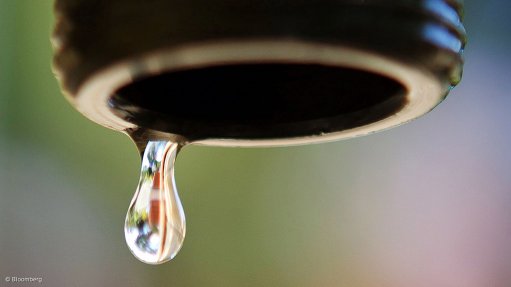
Photo by: Bloomberg
The Department of Water and Sanitation (DWS) held its final national raw water consultation today, Friday, 25 August 2017, at the Birchwood Hotel and Conference Centre in Boksburg, Ekurhuleni.
The consultation, which is aimed at soliciting the last round of inputs from key stakeholders in the water and sanitation sector, also presented the proposed tariffs for the 2018/19 financial year.
Speaking at the consultation, DWS Chief Financial Officer of the Water Trading Entity, Mr Mpho Mofokeng, presented the tariffs that will be tabled for the 2018/19 financial year and a 14.6% increase throughout the spectrum of raw water users was proposed.
The users, which include domestic and industrial, the agricultural sector, and the stream flow reduction sector, which includes the commercial forestry industry, would be the ones most affected by the changes.
In his presentation, Mr Mofokeng said “the Water Resource Infrastructure Charges for the domestic and industrial sectors will increase from 0% to 14.6%. The irrigation charges will also range from 0%- 14.6%”.
Furthermore, the water resource management charges for the domestic and industrial sectors will range from 0%-14.6%, and the forestry sector tariffs increase will also range from 0% - 14.6%. The irrigation sector charges will be capped and will range from 4%-14.6%, added Mr Mofokeng.
The proposed raw water use charges have been prepared in accordance with the 2007 Raw Water Pricing Strategy established in terms of Sections 56-60 of the National Water Act (NWA).
The primary aim of the Pricing Strategy is to find appropriate methods of funding water resource management, water resource development and use of waterworks as per section 56(2) of NWA.
The charges have been determined and set in a manner that will contribute to social equity, redress the imbalances of the past, protect ecological reserve, ensure financial sustainability and reflect the scarcity of water as essential commodity.
As part of his concluding remarks Mr Mofokeng said, “The new tariffs by no means result in previous debt being revoked; in essence all municipalities, farmers and users who still have outstanding debt with the department are liable for such debt.
Mr Mofokeng also stated that the department has improved its tracking process and out of 27 865 queries lodged, 25 717 which range from tariffs, billing frequency, proof of payment, invoice or statement not received, disputes of customer balance, billing duplication, etc. have been resolved with 2148 queries still open.
Issued by Department of Water and Sanitation